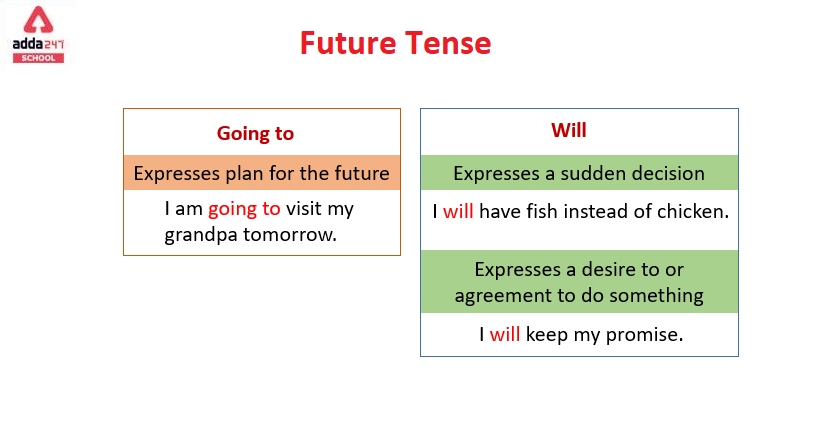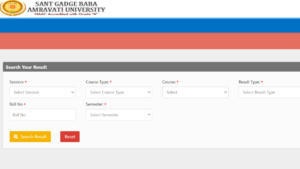Future Tense
The future tense includes all actions that will take place in the future. Future tenses, like other tenses, can be identified by the verb form and the auxiliary verbs used.
This article will teach you definitions, structures, usage rules, and examples.
Future Tense – Definition
The ‘future tense’ is defined by the Cambridge Dictionary as ‘the form of the verb used when talking about things that will happen or exist’. According to the Collins Dictionary, the “future tense” is defined as “a verb tense used when the action or event being described occurs after the time of the utterance.” The Merriam-Webster dictionary defines the future tense as “a tense used to refer to the future”.
Future Tense Types
There are four different types of Future tenses in the English language.
- Simple future tense: To describe an action that is going to take place in the future.
- Future Continuous Tense: used to tell the possibility of an action that is going o take place in the future.
- Future Perfect Tense: this tense is used to tell the action that will finish sometime in the future.
- Future Perfect Continuous Tense: describes the action that tells an action will continue.
Future Tense Formula
The formula/ structure of Future Tense is as follows:
| Structure of Present Tense | |||
| Simple future tense | Future continuous tense | Future perfect tense | Future Perfect Continuous Tense |
| Subject + will+base form of the verb/verb+ rest of the sentence. | Subject + will+be + present participle (verb+ing) + the rest of the sentence | Subject + will+ have + past participle (third form of the verb) + rest of the sentence. | Subject + will+ have + been + present participle (verb+ing) + since/for (if needed) + the rest of the sentence. |
Note: won’t is the contraction used for will + not
Future Tense Rules
- The Future Perfect Tense is used to describe an action that will occur at a later date and time. The Tense is formed by combining the words “will” and “have” with the past participle of the verb.
For example -I will have my lunch before the show ends. - The Future Continuous Tense depicts an action that will most likely take place in the future and last for a set amount of time. It consists of the terms – will+be+the present participle (the root verb + -ing). For example – I’ll be doing my schoolwork till about 10 a.m. tomorrow.
- The Future Perfect Continuous Tense defines an action that will last until a specific date in the future. It is constructed from the participle will+have+been+present.
For example – She will have her lunch before 1 pm the next day.
Future Tense Examples
Examples of Simple Future Tense are given below:
- She won’t go to school daily.
- You will read this chapter.
- I will do exercise every morning.
- The Earth will revolve around the sun.
- Will cats drink milk?
Examples of Future Continuous Tense are given below:
- She will be learning the chapter.
- The teacher will be teaching in the class.
- Will birds be chirping on trees?
- They won’t be going anywhere.
- Some people will be following her.
Examples of Future Perfect Tense are given below:
- She will have watched this movie.
- I will have never gone there.
- Will he have completed his work?
- Will they have taken their lunch?
- We will have learned this lesson.
Examples of Future Perfect Continuous Tense are given below:
- We will have been living here since 1992.
- It will have been raining since morning.
- Children will have been studying for two hours.
- Jack will have not been doing this work for five hours.
- Ben will have not been playing a video game since 6 p.m.
Future Tense Worksheet
Fill in the blanks using the correct form of the verb given in the bracket according to the tense:
- The train ___ shortly. (will arrive/ arrives)
- The orientation program ___ for some time now. (will continue/continues)
- The dog __ barking a lot after the vaccine. (will be/ will have been)
- The book is quite lengthy. I ___ it for some more time. (will be reading/will have been reading)
- We ___ our house next month. (will paint/paints)
- My fiance ____ for me. (will be waiting/ waited)
- I ___ on work next week. (will be returning/returned)
- My relatives ___ us soon. (will visit/visits)
- It ___ new year next week. (will be/is)
- Jack____ completed the chore by then. (will have/will have been)
Check your answers
- The train will arrive shortly. (will arrive/ arrives)
- The orientation program will continue for some time now. (will continue/continues)
- The dog will be barking a lot after the vaccine. (will be/ will have been)
- The book is quite lengthy. I will be reading it for some more time. (will be reading/will have been reading)
- We will paint our house next month. (will paint/paints)
- My fiance will be waiting for me. (will be waiting/ waited)
- I will be returning to work next week. (will be returning/returned)
- My relatives will visit us soon. (will visit/visits)
- It will be the new year next week. (will be/is)
- Jack will have completed the chore by then. (will have/will have been)
Future Tense in Hindi
भविष्य काल में भविष्य में होने वाली सभी क्रियाओं को शामिल किया जाता है। भविष्य काल, अन्य काल की तरह, क्रिया रूप और प्रयुक्त सहायक क्रियाओं द्वारा पहचाना जा सकता है।
यह लेख आपको परिभाषाएँ, संरचनाएँ, उपयोग के नियम और उदाहरण सिखाएगा।
भविष्य काल – परिभाषा
कैम्ब्रिज डिक्शनरी द्वारा ‘भविष्य काल’ को परिभाषित किया गया है, ‘क्रिया के रूप में उपयोग की जाने वाली चीजों के बारे में बात करते समय या अस्तित्व में’। कोलिन्स डिक्शनरी के अनुसार, “भविष्य काल” को “एक क्रिया काल” के रूप में परिभाषित किया जाता है, जब क्रिया या घटना का वर्णन उच्चारण के समय के बाद होता है।” मरियम-वेबस्टर डिक्शनरी भविष्य काल को “भविष्य को संदर्भित करने के लिए इस्तेमाल किया जाने वाला काल” के रूप में परिभाषित करती है।
Future Tense Example in Hindi
काल के अनुसार कोष्ठक में दी गई क्रिया के सही रूप का प्रयोग कर रिक्त स्थानों की पूर्ति कीजिए :
ट्रेन ___ शीघ्र ही। (आएगा/आएगा)
पिछले कुछ समय से उन्मुखीकरण कार्यक्रम ___। (जारी रहेगा/जारी रहेगा)
कुत्ता __ टीका लगाने के बाद बहुत भौंकता है। (होगा/होगा)
किताब काफी लंबी है। मैं इसे कुछ और समय के लिए ___ करता हूं। (पढ़ रहा होगा/पढ़ रहा होगा)
हम ___अगले महीने अपना घर। (पेंट/पेंट करेंगे)
मेरे मंगेतर ____ मेरे लिए। (प्रतीक्षा/प्रतीक्षा की जाएगी)
मैं ___ अगले सप्ताह काम पर हूँ। (वापसी/लौटाई जाएगी)
मेरे रिश्तेदार ___ हम जल्द ही। (विज़िट/विज़िट करेंगे)
यह ___नया साल अगले हफ्ते। (होगा/है)
जैक____ ने तब तक घर का काम पूरा कर लिया था। (होगा / रहा होगा)
अपने जवाब की जांच
ट्रेन कुछ ही देर में आएगी। (आएगा/आएगा)
ओरिएंटेशन प्रोग्राम अभी कुछ समय तक चलेगा। (जारी रहेगा/जारी रहेगा)
टीका लगने के बाद कुत्ता बहुत भौंक रहा होगा। (होगा/होगा)
किताब काफी लंबी है। मैं इसे कुछ और समय के लिए पढ़ूंगा। (पढ़ रहा होगा/पढ़ रहा होगा)
हम अगले महीने अपने घर को पेंट करेंगे। (पेंट/पेंट करेंगे)
मेरे मंगेतर मेरा इंतजार कर रहे होंगे। (प्रतीक्षा/प्रतीक्षा की जाएगी)
मैं अगले सप्ताह काम पर लौटूंगा। (लौटाया जाएगा/लौटाया जाएगा)
मेरे रिश्तेदार जल्द ही हमसे मिलने आएंगे। (विज़िट/विज़िट करेंगे)
अगले हफ्ते नया साल होगा। (होगा/है)
जैक तब तक घर का काम पूरा कर चुका होगा। (होगा/होगा)
Future Tense- FAQs
Q.1 What is Future Tense?
Ans. The future tense includes all actions that will take place in the future. Future tenses, like other tenses, can be identified by the verb form and the auxiliary verbs used.
Q.2 How many future tenses are there in the English language? Name them.
Ans. There are four future tenses in the English language as follows:
- Simple future tense
- Future Continuous Tense
- Future Perfect Tense
- Future Perfect Continuous Tense
Q.3 Give some examples of Future Tense.
Ans.
- You will read this chapter.
- Ben will have not been playing a video game since 6 p.m.
- The teacher will be teaching in the class.
- I will have never gone there.
Q.4 Why do we use Future Tense?
Ans. Future Tense is used to tell the actions which are going to happen in the upcoming time.
Q.5 What is the formula for Simple Future Tense?
Ans. Subject + will + base form of the verb + rest of the sentence.
Related Post:
- Past Tense: Examples, Formula, Rules, Verbs, Structure, Words, Chart
- Present Tense- Definition, Types, Examples, Rules, Structure, Chart
- Past Perfect Continuous Tense: Examples, Formula, Sentences, Exercises, Rules
- Past Perfect Tense-Examples, Formula, Exercise, Rules, Structure
- Simple Past (Indefinite) Tense- Examples, Definition, Formula, Exercise, Rules
- Past Continuous Tense: Examples, Exercises, Formula, Rules, Structure,
- Present Perfect Continuous Tense: Examples, Formula, Sentences, Exercises, Rules
- Present Continuous Tense: Examples, Exercises, Formula, Rules
- Simple Present/Indefinite Tense- Examples, Exercises, Rules, Sentences, Formula









 BTEUP Result 2025 Out at bteup.ac.in, Do...
BTEUP Result 2025 Out at bteup.ac.in, Do...
 SGBAU Result 2025 Out, Check Summer Seme...
SGBAU Result 2025 Out, Check Summer Seme...
 How To Prepare for CUET Accountancy Exam...
How To Prepare for CUET Accountancy Exam...









